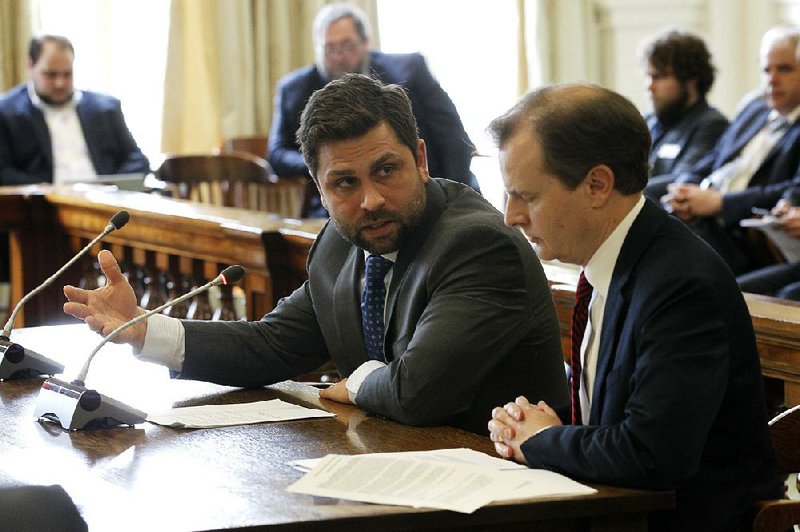A Senate committee approved a proposal Wednesday to raise about $10.5 million a year from new tobacco and medical marijuana tax revenue to help bring a National Cancer Institute-designated facility to Arkansas.
House Bill 1565 by Rep. Andy Davis, R-Little Rock, cleared the Senate Revenue and Tax committee on a split voice vote.
The legislation would raise money to help the University of Arkansas for Medical Sciences' Winthrop P. Rockefeller Cancer Institute establish and retain National Cancer Institute recognition by dedicating receipts from the sales and special privilege taxes on medical marijuana, increasing the required markup on cigarettes and raising the tax on packs of cigarette papers by 50 cents.
The bill also will increase the minimum tobacco-buying age in Arkansas from 18 to 21 by 2021.
Public health advocates say that bringing a National Cancer Institute-recognized facility to Arkansas will expand the cancer treatment options available to Arkansans, but several advocacy organizations have publicly opposed the bill because they see several provisions as handouts to the tobacco industry.
[RELATED: Complete Democrat-Gazette coverage of the Arkansas Legislature]
The bill includes a provision that would preclude cities and counties from regulating tobacco products more strictly than the state. The bill's sponsors removed a controversial portion of the bill that would have taxed "modified-risk tobacco products" at a reduced rate if federal regulators ever approve such products.
Once the bill is fully implemented and the additional tax revenue is dedicated to UAMS, officials from the Arkansas Department of Finance and Administration expect the bill to reduce revenues flowing to the state through general and special revenues by about $6 million a year. The largest revenue hit would come from reduced sales tax receipts on tobacco products prompted by the increased tobacco-buying age.
Dr. Cam Patterson, the UAMS chancellor, said that National Cancer Institute designation would triple the amount of federal funding available to the institution.
UAMS, Patterson said, needs to increase its external research support by about $5 million a year, and it hopes to use the additional state funding to recruit researchers to Arkansas who have already secured such backing for their research.
The medical school is also privately raising money to the same end.
"The fact that there's state support is going to make philanthropists more eager to contribute," he said. "And the fact that the state is actually going to see a match from philanthropic funds means we're going to maximize the impact of the state money that we get."
There's been a bipartisan push in the General Assembly this year to pursue the recognition for UAMS, and lawmakers established a trust fund to hold private and public dollars raised for the effort. UAMS officials hope to raise about $30 million.
There are 70 National Cancer Institute-designated facilities in 36 states, but none in Arkansas.
No one testified against the bill on Wednesday, but representatives from the American Cancer Society, American Heart Association and American Lung Association had spoken against the bill before it passed in House committee.
They took issue with the measure that pre-empts localities from more strictly regulating tobacco products. Harrison and Helena-West Helena, for instance, already require those purchasing tobacco to be at least 21. Sen. Jonathan Dismang, R-Searcy, said Thursday that those local provisions would be rolled back until 2021 under the legislation, which he cosponsored.
Currently, Arkansas is one of 18 states that don't prevent cities and counties from further regulating tobacco, according to the U.S. Centers for Disease Control. Davis said that disparate regulations on the local and state levels make it more difficult for state tobacco regulators to enforce to law.
The public health advocacy groups also opposed phasing in the increased tobacco-buying age, instead backing a bill that passed the House committee that would raise the age immediately. Both bills allow military members who are at least 18 to purchase tobacco.
Michael Keck, Arkansas government relations director for the American Cancer Society Cancer Action Network, said Wednesday that the group still opposed the legislation while supporting the pursuit of National Cancer Institute designation.
"The funding bill involved tobacco policy issues with which we had disagreements," he said. "It was apparent that those things were not going to change. It was also apparent that continuing a public debate or discussion about it was not going to change anything."
The bill's sponsors have said they attempted to strike a compromise to ensure it was palatable for as many stakeholders as possible.
"This bill is on the brink of pushing just about everyone involved as far as they can without having outright opposition," Dismang said. "The goal was to become NCI. There are more controversial bills that will be coming that we can make a bigger policy statement in regards to tobacco usage or e-cigarettes or whatever it may be. That was not the goal of this bill."
Metro on 03/14/2019
